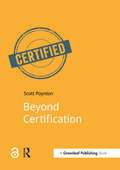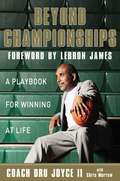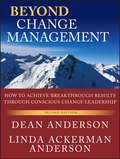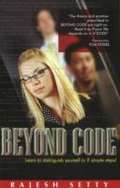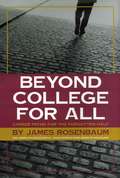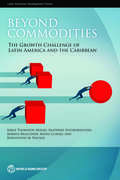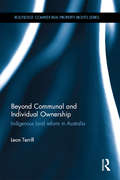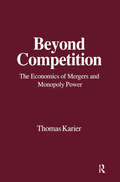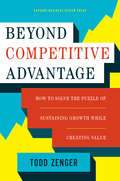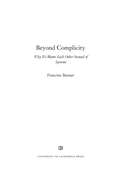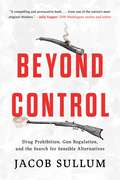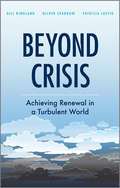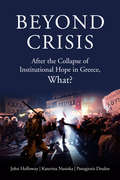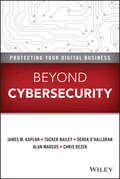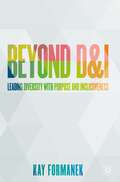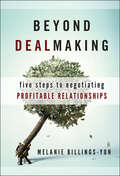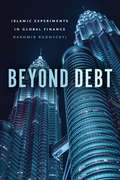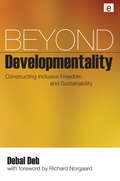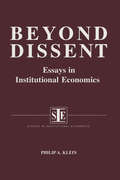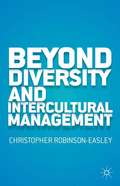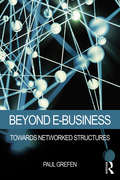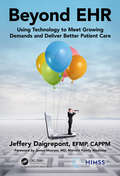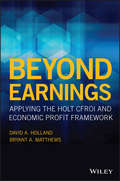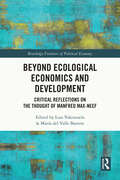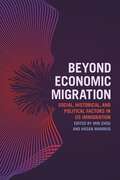- Table View
- List View
Beyond Certification (Doshorts Ser.)
by Scott PoyntonThis book is free to download in PDF and EPub formats. Is certification the solution? Can it deliver urgently needed improvements to complex problems like deforestation and the exploitation of people? In this controversial new book, Scott Poynton, founder of The Forest Trust, makes a compelling case for a new approach to social and environmental problems that goes "beyond certification".Certification emerged from the 1992 Rio Earth Summit amidst great hope. Since then, despite a proliferation of certification schemes in twenty-five industry sectors, the destructive and irresponsible exploitation of natural and human resources has grown still worse. Beyond Certification reviews the positive aspects of certification, of which there are many, but argues that we can no longer afford to gloss over its failures. The book offers an alternative model, VT-TV, based on Values, Transparency, Transformation and Verification, which the author has been exploring and implementing with over 70 companies and industries around the world. These companies are transforming the story of the raw materials they use – wood, palm oil, pulp and paper, stone, charcoal, soy, beef, sugar, dairy, rubber, coffee, cocoa and coconut. Mining companies are also exploring this approach, making decisions aligned with fundamental values and what they know to be right.The results? Trust is emerging as former combatants awake to the importance of working together. Guns have been removed from forests, land set aside for protection, worker rights and conditions improved and long-standing conflicts have been resolved as people confront their legacies. Beyond Certification does not claim that this VT-TV model is the only solution. Rather, it shows how new and seemingly radical thinking can catalyze positive change. Included: the limits of roundtable certification illustrated with real, practical examples; the intricacies of the change process – how companies move from destructive to more responsible practices; how to implement more holistic, economically effective, durable systems to better protect people and the environment.
Beyond Championships: A Playbook for Winning at Life
by Lebron James Chris Morrow Dru Joyce IIAs the coach of one of high school basketball’s greatest programs, Coach Dru Joyce has been mentor and motivator to some of the nation’s best young players, including basketball legend LeBron James. Despite having virtually no experience in the sport, in less than ten years Dru went from a no-name fan to one of the highest profile basketball coaches in the country. With insight and grit earned from his years on and off the court, Coach Dru shares for the first time the secrets to his teams’ success and his own coaching achievements. Far more than a sports book, Beyond Championships is a blueprint for anyone looking to make better choices, reach their full potential, and become winners in all areas of life. As Dru outlines the nine principles that he promotes to his players and tries to live in his own life as well, you’ll discover that the solid foundation on which he built so many successful basketball programs can be applied to almost any situation. As you assess your chosen path in life and look for ways to embark on a more inspiring and rewarding journey, Coach Dru offers an accessible and relatable roadmap for personal evolution.
Beyond Change Management: How to Achieve Breakthrough Results Through Conscious Change Leadership (J-b O-d (organizational Development) Ser. #28)
by Anderson Linda Ackerman Dean Anderson"With this extensively upgraded second edition, Dean Anderson and Linda Ackerman Anderson solidify their status as the leading authorities on change leadership and organizational transformation. This is without question the most comprehensive approach for leaders who are serious about making change a strategic discipline. " -Jim Kouzes, Author, The Leadership Challenge and The Truth About Leadership A comprehensive look at what it really takes to lead transformation successfully, written by two of the "masters of the craft. " The author's best-selling first edition has been significantly updated to deliver critical insights about how leaders can achieve breakthrough results from transformational change, even in these challenging times. The book introduces conscious change leadership and provides insights about the critical human and change process dynamics that leaders must be aware of in order to succeed, and reveals why most leaders do not see these dynamics. Most importantly, it highlights the shift in worldview leaders must make to deliver greater success. The book outlines the author's highly successful "multi-dimensional, process approach" to transformation, addressing change at the organizational, team, relational, and personal levels. It thoroughly addresses leadership mindset and behavioral modeling, culture change, and large systems implementations, providing best practices developed over three decades of successful consulting to Fortune 500 executives. Written for executives and managers, OD consultants, change managers, project managers, and change consultants, this must read book provides the foundation for successful change leadership and consulting. Based on thirty years of action research with Fortune 500 companies, government agencies, the military, and large non-profit global organizations Provides worksheets, tools, case examples, and assessments that you can immediately apply to all types of change efforts Contrasts two vastly different leadership approaches to change, and reveals why only one works Provides solutions for turning employee resistance into commitment Outlines the common mistakes in change and how you can avoid them Reveals the differences between transformation and other types of change so you can build strategies that really get results Beyond Change Management advances the field of change leadership, and takes the concept of managing change in organizations to a whole new level. It is a must read for anyone wanting to stay abreast of advancements in the field. Together with its companion volume, The Change Leader's Roadmap: How to Navigate Your Organization's Transformation, these books can be used as texts in corporate or graduate school training programs and courses.
Beyond Code: Learn to Distinguish Yourself in 9 Simple Steps!
by Rajesh SettyThrough his work with hundreds of technology professionals, Rajesh Setty has had a bird's eye view of careers that soared and careers that stalled. In the IT arena, Setty noted that while some people succeeded beyond imagination, most people seemed to get stuck about ten or fifteen years into their careers. After careful observation, interviews and insights, Setty realized that the top performers in the IT services industry definitely had a different set of standard practices for distinguishing themselves. To share their secrets, Setty created Beyond Code. In Beyond Code Setty explains that today's tech pros are facing the crisis of commoditization and that in order to thrive, it is imperative that they learn to stand out. Moreover, Beyond Code functions as a blueprint for professionals who want to go from acceptable to exceptional.
Beyond College For All: Career Paths for the Forgotten Half
by James E. RosenbaumIn a society where everyone is supposed to go to college, the problems facing high school graduates who do not continue their education are often forgotten. Many cannot find jobs, and those who do are often stuck in low-wage, dead-end positions. Meanwhile employers complain that high school graduates lack the necessary skills for today's workplace. Beyond College for All focuses on this crisis in the American labor market. Around the world, author James E. Rosenbaum finds, employers view high school graduates as valuable workers. Why not here? Rosenbaum reports on new studies of the interaction between employers and high schools in the United States. He concludes that each fails to communicate its needs to the other, leading to a predictable array of problems for young people in the years after graduation. High schools caught up in the college-for-all myth, provide little job advice or preparation, leading students to make unrealistic plans and hampering both students who do not go to college and those who start college but do not finish. Employers say they care about academic skills, but then do not consider grades when deciding whom to hire. Faced with few incentives to achieve, many students lapse into precisely the kinds of habits employers deplore, doing as little as possible in high school and developing poor attitudes. Rosenbaum contrasts the situation in the United States with that of two other industrialized nations-Japan and Germany-which have formal systems for aiding young people who are looking for employment. Virtually all Japanese high school graduates obtain work, and in Germany, eighteen-year-olds routinely hold responsible jobs. While the American system lacks such formal linkages, Rosenbaum uncovers an encouraging hidden system that helps many high school graduates find work. He shows that some American teachers, particularly vocational teachers, create informal networks with employers to guide students into the labor market. Enterprising employers have figures out how to use these networks to meet their labor needs, while students themselves can take steps to increase their ability to land desirable jobs. Beyond College for All suggests new policies based on such practices. Rosenbaum presents a compelling case that the problems faced by American high school graduates and employers can be solved if young people, employers, and high schools build upon existing informal networks to create formal paths for students to enter the world of work. A Volume in the American Sociological Association's Rose Series in Sociology
Beyond Commodities: The Growth Challenge of Latin America and the Caribbean
by Clavijo Ekaterina Vostroknutova Jorge Thompson Araujo Konstantin M. Wacker Markus BruecknerBeyond Commodities shows that Latin America and the Caribbean's growth performance over the last decade cannot be reduced to the commodity boom: growth-promoting reforms that strengthened financial development, increased trade openness and improved infrastructure development also played a significant role and can continue doing so. Based on the econometric analysis of panel data from the 1970-2010 period for 126 countries, the study shows that, while the commodity boom facilitated growth in most of the region, it did not determine it. Domestic pro-growth policies and the maintenance of a sound macro-fiscal framework played a central role in explaining the region's good performance during last decade. It also shows that new growth "stars ? such as Panama, Peru, Colombia and the Dominican Republic emerged during this period. In addition, a benchmarking exercise reveals which policy gaps will lead to the highest potential growth-payoffs for each country and helps identify potential trade-offs. Finally, with the worsening of external conditions, the authors conclude that the countries of Latin America and the Caribbean have no choice but to turn their attention to domestic drivers to keep growth going, as the structural reforms agenda remains unfinished.
Beyond Communal and Individual Ownership: Indigenous Land Reform in Australia (Routledge Complex Real Property Rights Series)
by Leon TerrillOver the last decade, Australian governments have introduced a series of land reforms in communities on Indigenous land. This book is the first in-depth study of these significant and far reaching reforms. It explains how the reforms came about, what they do and their consequences for Indigenous landowners and community residents. It also revisits the rationale for their introduction and discusses the significant gap between public debate about the reforms and their actual impact. Drawing on international research, the book describes how it is necessary to move beyond the concepts of communal and individual ownership in order to understand the true significance of the reforms. The book's fresh perspective on land reform and careful assessment of key land reform theories will be of interest to scholars of indigenous land rights, land law, indigenous studies and aboriginal culture not only in Australia but also in any other country with an interest in indigenous land rights.
Beyond Competition: Economics of Mergers and Monopoly Power
by Thomas KarierFirst Published in 1994. Routledge is an imprint of Taylor & Francis, an Informa company.
Beyond Competitive Advantage: How to Solve the Puzzle of Sustaining Growth While Creating Value
by Todd ZengerYour company is turning in regular profits every year, and its market share is only getting bigger. Competitors can't touch you. So why is your stock price so sluggish? The answer is as simple as it is cruel: investors aren't interested in history, and they already know you're profitable and competitive-that knowledge is baked into your stock price.The hard reality is that a competitive advantage just isn't enough. Investors want companies to surprise them with unexpected value, which means that you can outperform market expectations only if you as a leader know how to find, create, and deliver a series of multiple competitive advantages.This is why a corporate theory is so important. A good corporate theory provides a compass for those at the strategic helm, guiding their decisions about what assets and activities to pursue, what investments to make, and what strategies to adopt. Behind every long-term corporate success story lies a basic theory about how that company creates value.In Beyond Competitive Advantage, strategy professor Todd Zenger describes what makes a great corporate theory and helps readers understand the many tensions and trade-offs they'll face as they apply the theory to meet the challenge of market expectations.Based on years of research and analysis, Beyond Competitive Advantage provides managers and executives with a framework for both sustaining value and creating growth.
Beyond Complicity: Why We Blame Each Other Instead of Systems
by Francine BannerAn ambitious study of our obsession with complicity that shows how we can all become "good accomplices." Beyond Complicity is a fascinating cultural diagnosis that identifies our obsession with complicity as a symptom of a deeply divided society. The questions surrounding what it means to be legally complicit are the same ones we may ask ourselves as we evaluate our own and others' responsibility for inherited and ongoing harms, such as racism, sexism, and climate change: What does it mean that someone "knew" they were contributing to wrongdoing? How much involvement must a person have in order to be complicit? At what point are we obligated to intervene? Francine Banner ties together pop culture, politics, law, and social movements to provide a framework for thinking about what we know intuitively: that our society is defined by crisis, risk, and the quest to root out hazards at all costs. Engaging with legal cases, historical examples, and contemporary case studies, Beyond Complicity unfolds the complex role that complicity plays in US law and society today, offering suggestions for how to shift focus away from blame and toward positive, lasting systemic change.
Beyond Control: Drug Prohibition, Gun Regulation, and the Search for Sensible Alternatives
by Jacob SullumIn this incisive book, Reason editor Jacob Sullum untangles America&’s twin crusades against guns and drugs, suggesting better-tailored alternatives that do more good while causing less harm. Does gun control work? What about drug prohibition? In this cogent examination of two of America&’s most enduring challenges, Reason Senior Editor Jacob Sullum traces the evolution of gun and drug laws from their dubious beginnings to today&’s divisive rhetoric. Based on data-driven analysis and compassionate consideration of the human costs imposed by the twin crusades against guns and drugs, Sullum recommends an alternative approach that focuses on reducing harm, including the harm caused by misguided policies. Sullum exposes the racist roots of gun control and drug control, noting that both policies continue to have a racially disproportionate impact. Even leaving aside the legacy of that dark history, he argues, both policies are unjust because they punish people for conduct that violates no one&’s rights. They are also dangerous to civil liberties because they encourage the expansion of government power at the expense of individual freedom. The burdens imposed by gun control and drug control reinforce each other, since gun possession increases penalties for drug offenses and drug offenses disqualify people from legally possessing guns. Yet there is little logic to these legal regimes, which penalize people for behavior that is not inherently criminal. Decades of research have produced scant evidence that popular gun control prescriptions such as assault weapon bans, universal background checks, restrictions on ownership, and red flag laws work as advertised. Research on the impact of the war on drugs likewise provides little reason to believe that its doubtful benefits outweigh its myriad costs. In both cases, the burdens often fall on peaceful individuals who pose no threat to public safety, and the policies seem ill-designed to reduce the problems they aim to address. Sullum notes that critics of gun control and critics of the war on drugs make similar points, complaining that these policies are unfair, invasive, poorly targeted, and ineffective. But because these two sets of critics tend to come from opposing political camps, they usually overlook their common ground. Beyond Control surveys that territory, showing that conservatives and progressive share concerns about overcriminalization, overzealous law enforcement, draconian penalties, and the erosion of civil liberties. Substance abuse, violence, and suicide are complex problems that cannot be solved by targeting inanimate objects or by arresting and incarcerating people who possess them. Beyond Control urges better-tailored alternatives that would do more good while causing less harm.
Beyond Crisis
by Oliver Sparrow Gill G. Ringland Patricia Lustig"If you want to know how countries, companies and individuals can master the winds and the waves that will dominate the next decade, this is the book for you."--Rupert Pennant-Rea, former editor of the Economist, Deputy Governor of the Bank of England"'If leading your organisation sometimes feels like changing the front wheel of a bicycle whilst toy are still pedalling it as fast as you can, this is a book you should read."--Sir David Brown, former Chairman, Motorola UK"Beyond Crisis is full of compelling reasons, clear advice and practical models to help almost any enterprise remain viable beyond the deeply unsettling systemic failures that characterise today's business environment."--Professor Richard David Hames, Dhurakilpundit University, Founding Director Asian Foresight Institute"We are in uncharted territory. There are few people who any longer think that the world post-crisis will be anything like the world before. Ringland, Sparrow & Lusting provide a clear description of the way that leaders need to think in this new reality. In doing so, they give us hope."--Estelle Clark, Business Assurance Director, Lloyds RegisterThe next decade will present organisational challenges on an unprecedented scale.Beyond Crisis shows how you can build a 'purposefully self-renewing organisation' which will survive and succeed in the midst of this chaos. The book shows how financial and economic crisis has blighted organisations in every sector, and then provide a range of tools and future scenarios for diagnosing problems and creating solutions.This is a welcome dose of clarity in uncertain times.
Beyond Crisis: After the Collapse of Institutional Hope in Greece, What? (KAIROS)
by John Holloway Panagiotis Doulos Katerina NasiokaThe anarchist or autonomist movement in Greece has been one of the strongest in the world yet it has failed to have a significant impact. Is there nothing beyond the world of capitalist destruction or can we still see some possibility for radical hope? The essays in this collection reflect on the experience of the crisis in Greece and its political implications for the whole world. They do not point a way forward but seek to open windows in the darkening sky of apparent impossibility.
Beyond Cybersecurity: Protecting Your Digital Business
by Alan Marcus James M. Kaplan Tucker Bailey Derek O'Halloran Chris RezekMove beyond cybersecurity to take protection of your digital business to the next level Beyond Cybersecurity: Protecting Your Digital Business arms your company against devastating online security breaches by providing you with the information and guidance you need to avoid catastrophic data compromise. Based upon highly-regarded risk assessment analysis, this critical text is founded upon proprietary research, client experience, and interviews with over 200 executives, regulators, and security experts, offering you a well-rounded, thoroughly researched resource that presents its findings in an organized, approachable style. Members of the global economy have spent years and tens of billions of dollars fighting cyber threats—but attacks remain an immense concern in the world of online business. The threat of data compromise that can lead to the leak of important financial and personal details can make consumers suspicious of the digital economy, and cause a nosedive in their trust and confidence in online business models. Understand the critical issue of cyber-attacks, and how they are both a social and a business issue that could slow the pace of innovation while wreaking financial havoc Consider how step-change capability improvements can create more resilient organizations Discuss how increased collaboration within the cybersecurity industry could improve alignment on a broad range of policy issues Explore how the active engagement of top-level business and public leaders can achieve progress toward cyber-resiliency Beyond Cybersecurity: Protecting Your Digital Business is an essential resource for business leaders who want to protect their organizations against cyber-attacks.
Beyond D&I: Leading Diversity with Purpose and Inclusiveness
by Kay FormanekD&I is no longer a passing fad. It’s not about legal compliance or HR box-ticking, in fact diversity and inclusion is a critical factor for success. #MeToo, #BlackLivesMatter and the ballooning disparate consequences of Covid-19 on minorities brings renewed emphasis on D&I agendas, and the economic reality that diverse talent is good for business and good for sustainability. In Beyond D&I, Kay Formanek brings her more than twenty years’ experience working with the world’s leading organizations to take diversity and inclusion into the strategic roadmap of the organization. Whether you’re a leader, HR practitioner, sponsor of a D&I initiative or an employee who wants to see your organization benefit from more inclusivity, the book equips you with the tools you need to develop the strategic case for diversity, craft a compelling narrative and chart a tailored roadmap to lock in diversity gains and close key performance gaps. As well as two core anchor models—the Virtuous Circle and Integrated Diversity Model— the book features case studies, profiles of inclusive leaders, engaging and intuitive visuals and a wealth of evidence-based initiatives that you can start implementing today. With five essential elements and six core capabilities, the result is a definitive, holistic and practical guide that will help you convert your D&I initiatives into sustainable diversity performance.
Beyond Dealmaking
by Melanie Billings-YunPraise for Beyond Dealmaking"Every potential rainmaker and savvy competitor needs Melanie Billings-Yun's GRASP method for negotiation. You'll never have to search for leads again. I highly recommend this book."-Jeffrey J. Fox, author, How to Be a Rainmaker, Rain, and How to Be a Fierce Competitor"Stepping back from the details of the deal, Beyond Dealmaking focuses on the bigger picture-engaging people to work together in an authentic way to resolve issues. Dr. Billings-Yun's accessible approach offers negotiators more than merely how to 'get to yes' but, more importantly, how to stay there."-Carol Frohlinger, coauthor, Her Place at the Table: A Woman's Guide to Negotiating Five Key Challenges to Leadership Success, and co-founder of Negotiating Women, Inc."The concepts advocated in Beyond Dealmaking are spot on, particularly for global negotiations and joint ventures such as ones I routinely dealt with in mergers and acquisitions. Attention to productive relationships is one element that consistently crosses cultures and geographies. Dr. Billings-Yun captures the essence of a complicated topic concisely, with concrete examples that bring it to life and a conversational tone that makes it a leisurely read."-Jacqui Winship, director, Corporate Strategy and Business Development, Whirlpool Corporation"Melanie Billings-Yun has produced an innovative, refreshing approach to negotiation based on her years of practical experience around the world. She treats negotiation as an on-going process that forms the core of a successful relationship, not as merely a free-standing transaction. Beyond Dealmaking takes us beyond 'yes' to build the sort of trust that ensures success."-Stephen Bosworth, dean, The Fletcher School of Law and Diplomacy, Tufts University"Finally, a clear-eyed how-to book that understands that negotiation is not just about terms, but about people. Beyond Dealmaking shows us how to make lasting agreements based on understanding, fairness, and respect. Filled with fascinating stories of negotiations of every type, this is a book that everyone can learn from to improve their work and their lives-and maybe even ease the burden on our overloaded courts."-Betty Roberts, arbitrator, mediator, and former Oregon Supreme Court Justice "I am delighted to see a considered and sustainable approach to negotiation that understands that actions, words, and fairness have an impact that continues far beyond the signing of a deal."-Edward C. Prescott, Ph.D., professor, and winner of the Nobel Prize for Economics
Beyond Debt: Islamic Experiments in Global Finance
by Daromir RudnyckyjRecent economic crises have made the centrality of debt, and the instability it creates, increasingly apparent. This realization has led to cries for change—yet there is little popular awareness of possible alternatives. Beyond Debt describes efforts to create a transnational economy free of debt. Based on ethnographic fieldwork in Malaysia, Daromir Rudnyckyj illustrates how the state, led by the central bank, seeks to make the country’s capital Kuala Lumpur “the New York of the Muslim world”—the central node of global financial activity conducted in accordance with Islam. Rudnyckyj shows how Islamic financial experts have undertaken ambitious experiments to create more stable economies and stronger social solidarities by facilitating risk- and profit-sharing, enhanced entrepreneurial skills, and more collaborative economic action. Building on scholarship that reveals the impact of financial devices on human activity, he illustrates how Islamic finance is deployed to fashion subjects who are at once more pious Muslims and more ambitious entrepreneurs. In so doing, Rudnyckyj shows how experts seek to create a new “geoeconomics”—a global Islamic alternative to the conventional financial network centered on New York, London, and Tokyo. A groundbreaking analysis of a timely subject, Beyond Debt tells the captivating story of efforts to re-center international finance in an emergent Islamic global city and, ultimately, to challenge the very foundations of conventional finance.
Beyond Developmentality: Constructing Inclusive Freedom and Sustainability
by Debal DebHistory tells us that industrial development with all of its pollution, inequity and exploitation is the inevitable destiny of human societies. Yet is this really the case or are we trapped in a prevailing 'develop-mentality' that demands an endless cycle of inputs, outputs, consumption and waste on a finite planet? And is there another, better way for humans and the biosphere? This incisive, epic work turns the dominant industrial development model and its economics upside down and argues for a new way of thinking about the meaning of development and the complexion of our economy. The book traces the origin and development of the concept of development in the economic context, and suggests a way to achieving post-industrial development with zero industrial growth. The book argues that sustainable development is possible only when concerns for biodiversity and human development are put at the centre of the economy and social policy. It both provides a theoretical foundation to sustainability and presents practical instances of sustainable production systems. Coverage is magisterial and includes history, ecology, economics, anthropology, policy analysis, population theory, sociology, the Marxian critique of capitalism, Orientalism, semiotics and sociology of science. These are interwoven in an accessible but challenging way that enables readers to look at development theory, economics, consumerism and environmentalism from a new vantage point. Distinguishing features includes a critique of development from a natural science perspective, a fresh and thorough account of the concept of sustainability both from a theoretical and empirical perspective and the application of an evolutionary biology metaphor to building a socially responsible alternative to the prevailing developmentality. This is the most sweeping coverage of critical issues in economics, environment, development and sustainability available. It is both an empowering and necessary read for students, academics, professionals and activists from across sustainability, development, economics and environmental studies and beyond, and an invaluable repository of information about the critical issues facing humanity as we continue to develop our over-crowded planet.
Beyond Dissent: Essays in Institutional Economics
by Philip A. KleinThis text provides an ethnography of a Chinese middle school based on fieldwork conducted in 1988 to 1989. It provides a way of looking at classroom and societal interactions in terms of the interplay among criticism, face and shame.
Beyond Diversity And Intercultural Management
by Christopher Anne Robinson-easleyBeyond Diversity and Intercultural Management develops a change model designed to challenge prevailing paradigms in the literature and conversations about equal employment opportunity, diversity, and intercultural management.
Beyond E-Business: Towards networked structures
by Paul GrefenIn Beyond E-Business: Towards Networked Structures Paul Grefen returns with his tried and tested BOAT framework for e-business, now fully expanded and updated with the very latest overview of digitally connected business; from business models, organization structures and architecture, to information technology. What used to be termed "e-business" is now simply business as usual. Today’s successful organizations are complex; they are part of dynamic business networks built on digital channels, going far beyond traditional e-business. This text provides invaluable insights of modern e-business integrated with networked business, going much further than the usual analysis of traditional e-business texts. Included is coverage of the Big Five—social media, mobile computing, big data, cloud computing, and the internet of things --as well as service-oriented business and technology. This essential text provides a compact roadmap to networked e-business for engineering, information systems or business students as well as professionals in the field.
Beyond EHR: Using Technology to Meet Growing Demands and Deliver Better Patient Care (HIMSS Book Series)
by Jeffery P. Daigrepont, EFPM, CAPPMToday, it is not uncommon for practices and hospitals to be on their second or third EHR and/or contemplating a transition from the traditional on-premise model to a cloud-based system. As a follow-up to Complete Guide and Toolkit to Successful EHR Adoption (©2011 HIMSS), this book builds on the best practices of the first edition, fast-forwarding to the latest innovations that are currently leveraged and adopted by providers and hospitals. We examine the role that artificial intelligence (AI) is now playing in and around EHR technology. We also address the advances in analytics and deep learning (also known as deep structured or hierarchical learning) and explain this topic in practical ways for even the most novice reader to comprehend and apply. The challenges of EHR to EHR migrations and data conversions will also be covered, including the use of the unethical practice of data blocking used as a tactic by some vendors to hold data hostage. Further, we explore innovations related to interoperability, cloud computing, cyber security, and electronic patient/consumer engagement. Finally, this book will deal with what to do with aging technology and databases, which is an issue rarely considered in any of the early publications on healthcare technology. What is the proper way to retire a legacy system, and what are the legal obligations of data archiving? Though a lot has changed since the 2011 edition, many of the fundamentals remain the same and will serve as a foundation for the next generation of EHR adopters and/or those moving on to their second, third, fourth, and beyond EHRs.
Beyond Earnings: Applying the HOLT CFROI and Economic Profit Framework
by David A. Holland Bryant A. MatthewsStep up stock selection with advanced valuation techniques Beyond Earnings provides finance professionals with the most advanced techniques available for complex valuation and corporate performance analysis. Deep in detail and comprehensive in scope, this book features the first empirical discussion of mean-reversion in corporate profitability and growth, with expert guidance toward practical solutions. By focusing on cash flow and the economics of a company’s performance, the discussion relates a more effective process for stock screening, selection, and valuation. Step-by-step calculations guide you through the application of the HOLT CFROI and Economic Profit approaches for measuring operating performance, and expert insight from Credit Suisse researchers and consultants sheds new light on familiar situations. Stock selection is the critical point in the performance matrix, and screening and valuation practices weigh heavily into a firm’s performance. As investors face increasing pressure to perform at ever-higher levels, this book provides essential analysis methods that help paint a more complete picture of a potential investment’s performance. Assess a firm’s performance accurately by adjusting for accounting distortions Calculate economic profit and CFROI Estimate future cash flow, profit streams, and the firm’s value Model terminal value and eliminate the perpetuity assumption The effort to outperform benchmarks and exchange-traded funds grows increasingly Sisyphean as professional investors face mounting pressure from all sides. When the market is not performing to the level required to attain strategic goals, smarter stock selection becomes the lynchpin of high-performing firms. Advanced modeling provides an edge over traditional models in that it paints a truer picture of a corporation’s status, and extends that vision further into the future to facilitate more educated decision-making. Beyond Earnings is the professional manual to enhanced stock analysis and valuation, with invaluable guidance you won’t find anywhere else.
Beyond Ecological Economics and Development: Critical Reflections on the Thought of Manfred Max-Neef (Routledge Frontiers of Political Economy)
by Luis Valenzuela del Valle Barrera, MaríaThe interrelationship among development, environment, and human needs is one of the key issues being faced by the world today. The Chilean economist, Manfred Max-Neef, was a leading thinker on this dynamic, and this book provides both an introduction to and analysis of his work and ideas. Arranged in three main sections – “Human needs and wellbeing”, “Development, growth and sustainability”, and “Methodology of economics” – the chapters in this book contribute to on-going debates on issues as important as human development, the limits of economic growth, deep ecology, sustainable consumption, entrepreneurship, climate change, interdisciplinarity, and the methodology and practice of economics. The contributors to this volume provide a broad range of different critical perspectives on these issues, and the chapters are arranged in dialogue with each other to provide the reader with a rounded view of the legacy of Max-Neef. This book is vital reading for all those interested in ecological economics, environmental economics, development economics, methodology and philosophy of economics, and heterodox economics.
Beyond Economic Migration: Social, Historical, and Political Factors in US Immigration
by Min Zhou and Hasan MahmudOffers a critique of the economic model of immigrationMost understandings of migration to the US focus on two primary factors. Either there was trouble in the home country, such as political unrest or famine, that pushed people out, or there was a general yearning for “a better life” or “more opportunity,” often conceptualized as the American Dream. Although many contemporary migrants in the United States have been driven by economic interests, the processes of immigration and integration are shaped also by the intersection of a range of noneconomic factors in both sending and receiving countries. The contributors to Beyond Economic Migration offer a nuanced look at a range of issues affecting motives to migrate and outcomes of integration, including US immigration policy and the visa system, labor market incorporation, employment precarity, identity and belonging, and transnationalism relating to female migrants, student migrants, and temporary foreign workers. Beyond Economic Migration argues that, for the dream of fair and equitable migration to be realized, analyses of cross-border movements, resettlement, and integration must pay attention to how migrants’ individual attributes interact with institutional mechanisms and social processes.
